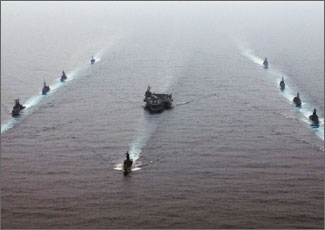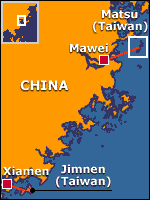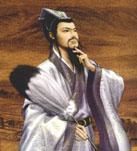
Fast-forward to June, 2013. Consider the following sequence of events -
The Republic of China's president, a DPP independence hawk with a legislative majority, announces his intention to seek a constitutional amendment changing the island's name to the Republic of Taiwan. Despite PRC warnings, the US government's response is watered down to 'non-support', in the face of overwhelming sympathy for Taiwan from Congress and the American public.
Amidst mounting rhetoric from Beijing, two US carrier battlegroups are despatched to the waters east of Taiwan. The ROC government unveils its constitutional changes, which - in another unpleasant surprise for Washington - exclude any part of mainland China from the new republic, amounting to irrevocable rejection of the 'One China' principle. The PLA is mobilised.
With the American media howling 'appeasement', the US president reiterates that an attack on Taiwan is a matter of grave concern for the United States. All Washington's regional allies declare neutrality; Japan and South Korea even deny the US use of military bases on their soil. China's central bank floods the market with US treasuries, sending Wall Street and the US dollar into tailspin. Congress passes a landslide resolution pledging to defend Taiwan.
The PLA occupies Jinmen and Matsu, and in response the two US carriers enter the Strait. China announces a blockade and fires a hundred missiles into Taiwan; the ROC airforce hits back at mainland targets. The penny drops when US and Chinese forces engage. Who shot first remains in doubt, but the Chinese simultaneously launch an electronic warfare offensive, cancelling the traditional US information dominance of the battlefield.
A US carrier goes to the bottom, with almost all hands. The American public cries for blood and US planes join the ROC airforce to plaster targets along China's southeast coast. Both Washington and Beijing put their strategic nuclear forces on maximum alert. Urged to send the B2's against Beijing and Shanghai, the US president blinks at armageddon and calls his Chinese counterpart, who's also getting cold feet. China lifts the blockade and withdraws its forces on a number of conditions, including the resignation of Taiwan's president and the opening of reunification talks. Faced with a threatened US withdrawal, Taipei buckles.
In the aftermath, the US severs diplomatic ties with China and slaps a total ban on commercial intercourse. The US and the world economy suffer, but not as much as China, which for a while looks ready to descend into chaos. But the Communist Party clings on and settles in for a new cold war across the Pacific, which three decades later is still going strong. After a decade of talks, Taiwan joins China in a loose confederation.
A US carrier goes to the bottom, with almost all hands. The American public cries for blood and US planes join the ROC airforce to plaster targets along China's southeast coast. Both Washington and Beijing put their strategic nuclear forces on maximum alert. Urged to send the B2's against Beijing and Shanghai, the US president blinks at armageddon and calls his Chinese counterpart, who's also getting cold feet. China lifts the blockade and withdraws its forces on a number of conditions, including the resignation of Taiwan's president and the opening of reunification talks. Faced with a threatened US withdrawal, Taipei buckles.
In the aftermath, the US severs diplomatic ties with China and slaps a total ban on commercial intercourse. The US and the world economy suffer, but not as much as China, which for a while looks ready to descend into chaos. But the Communist Party clings on and settles in for a new cold war across the Pacific, which three decades later is still going strong. After a decade of talks, Taiwan joins China in a loose confederation.
At this point I should confess that this cheerful scenario isn't my own work, but a summary of the second chapter in America's Coming War with China. It does happen to tally almost exactly with an essay I wrote last year on the ominous trends in the 'Taiwan problem'. Unless some serious political lifting is done, we're more likely than not to have a war in the Strait within the next ten years.
It's high time that someone with foreign policy credentials spotlighted this issue, in the form of an accessible read. So kudos to America's Coming War With China, even if in other bits it shows up the incapacity of Western commentators to get basic China facts straight. Memo to Mr. Carpenter: it wasn't the Ming dynasty which occupied Taiwan in 1661.
That lifting needs to come from both sides of the Pacific. At a general level the whole power structure of the Asia-Pacific needs a makeover, as I argued a while back on this blog, if Sino-US conflict is to be averted. On Taiwan specifically, the US needs to junk 'strategic ambiguity' in favour of a tougher stance towards the governments on both sides of the Strait. The key elements of the above scenario are Beijing's readiness to attack Taiwan upon a decisive bid for independence, and Washington's failure to preempt such a bid or squash it the moment it happens (as happened to Taipei's nuclear program). A clearer US commitment to the status quo wouldn't guarantee against this situation, but it would help.
It's high time that someone with foreign policy credentials spotlighted this issue, in the form of an accessible read. So kudos to America's Coming War With China, even if in other bits it shows up the incapacity of Western commentators to get basic China facts straight. Memo to Mr. Carpenter: it wasn't the Ming dynasty which occupied Taiwan in 1661.

The BBC reports on Taiwan's new acquisition - 'Jimnen', not to be confused with Jinmen
Scoff at this scenario if you like, but recall that September 11 was unthinkable before it happened. (Whether some people foresaw the use of passenger jets as weapons of terrorism is besides the point). By contrast, analysts have been warning for the better part of a decade - Carpenter's book was published in 2001 - that the 'Taiwan problem' is heading towards a violent resolution. We even had a dress rehearsal in the form of the 1996 Straits Crisis, which played out along similar lines to Carpenter's scenario. Since then the PRC's military position has strengthened, vis-a-vis the US and especially the Republic of China, which has elected a president who rejects the basic principle underpinning Beijing's approach to the problem.
And yet we're sill waiting for some creative thinking in Washington about management of the Taiwan issue and relations with the PRC more generally. Instead we've got a 'China Threat' literary industry, long on hysteria and short on knowledge of contemporary China, let alone the country's history and long-term prospects. At the official level we now have a US strategy for 'full-spectrum dominance' and the cleansing of terrorism from the earth, into which China is expected to fit meekly. The issue of Taiwan's independence gets once sentence, and it doesn't offer concessions to Beijing.
Next to the potential consequences of this war, the threat posed by Islamic extremism pales into insignificance.
Next to the potential consequences of this war, the threat posed by Islamic extremism pales into insignificance.

No comments:
Post a Comment